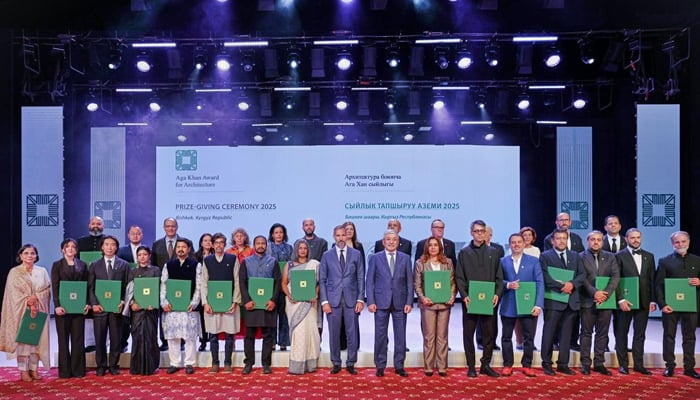Select Language:
Seven architecture projects that protect communities from climate hazards, conserve cultural heritage, and develop affordable housing were honored at the Aga Khan Award for Architecture ceremony held at the Kyrgyz National Philharmonic Hall.
His Highness the Aga Khan attended the event alongside His Excellency Adylbek Kasymaliev, Chairman of the Cabinet of Ministers of Kyrgyzstan, to oversee the proceedings.
The selected projects, sharing a prize of $1 million, showcase architecture’s ability to tackle some of humanity’s most urgent issues. Notable designs include flood-resistant bamboo homes that can be moved when river courses change; a community-driven urban heritage restoration project; and a repurposed oil company site transformed into a vibrant public space with a community center.
Attendees included distinguished winners, government officials, architecture specialists, the Award’s Steering Committee and Master Jury members, and other prominent guests. This celebration marks the close of the Award’s 16th triennial cycle.
Throughout the week in Bishkek, a series of events gathered architects, urban planners, policymakers, and community leaders to explore how architecture and city planning can be catalysts for positive change worldwide.
One of the award recipients was Vision Pakistan, based in Islamabad, which won recognition for its innovative, socially impactful, and eco-conscious design. The project features a multi-story building with lively facades inspired by Pakistani and Arab craftsmanship, hosting a charity dedicated to empowering youth through vocational training.
The jury praised the building for offering a new educational approach, filling spaces with light, creating interesting spatial experiences, and maintaining cost efficiency.
Founded in 1977 by the late His Highness Prince Karim Aga Khan IV, the Aga Khan Award stands out among architectural honors. It emphasizes projects that combine design excellence with tangible improvements to quality of life, highlighting the roles of municipalities, builders, clients, artisans, and engineers alongside architects.
Since inception, the award has recognized over 130 projects globally, influencing architectural dialogue within the Muslim community and beyond.
His Highness stressed the vital role of architects today: “With today’s climate fluctuations, architects have a profound responsibility—and a unique opportunity—to design structures that buffer these changes and protect the most vulnerable. Flexibility to adapt to unforeseen circumstances was central to this cycle’s jury considerations,” he said.
He further explained that in addition to environmental justice, architecture holds great promise for advancing social justice. “Affordable housing, access to green spaces, education, healthcare, and cultural preservation all depend on the creativity of architects and wise urban planning,” he pointed out. Buildings, he noted, can elevate living standards, inspire reverence, and provide solutions for future generations.
“Exceptional architecture directly addresses critical development challenges and helps create an inclusive, safe, and dignified world for all,” he concluded. Earlier that day, His Highness also took part in a special stamp cancellation ceremony, commemorating the awards with a postage stamp issued by Kyrgyzstan’s postal service.







